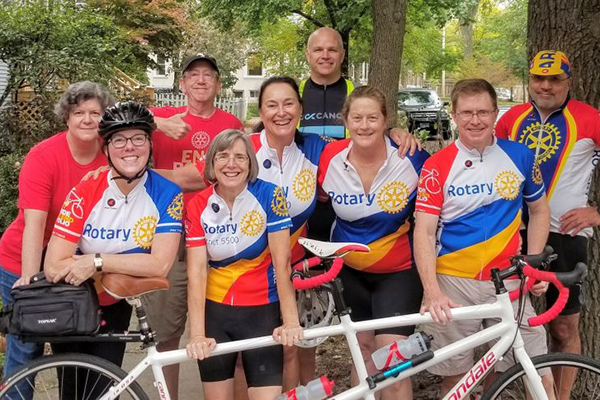
By Kristin Brown, past president, Rotary Club of Evanston Lighthouse
We ride so that others may walk. I don’t know who said it first, but the phrase has become a tagline for Rotary cyclists around the world, pedaling for PolioPlus, logging miles, and raising funds in the global effort to fully eradicate this disease.
My husband, Mahmoud, and I are looking forward to returning to Tucson, Arizona, for my seventh and his fifth Ride to End Polio. It would be my eighth and his sixth ride if everything hadn’t ground to a halt with the COVID-19 pandemic in 2020. For all kinds of reasons, getting back on the bike this year is an important statement: of Rotary’s determination to finish what we started 36 years ago and of our collective determination to reclaim our lives after 18 months of relative isolation.
For me, and especially for Mahmoud, participating in the ride is also a testament to his determination to recover from a severe case of COVID-19. When he emerged from a drug-induced coma toward the end of eight weeks in the hospital and two stints on a ventilator, Mahmoud was stunned to discover his legs could no longer support him. Before he could come home, he would need to spend a month in inpatient rehab learning to sit up, stand, and walk again.
One year ago, it was hard to imagine that I would describe Mahmoud as “lucky.” In retrospect, we both recognize that the fact that he is alive and well and able to get on a bike in Tucson is the result of a combination of good luck, hard work, and determination.
Mahmoud is lucky that we live in an area where local leaders, employers, and healthcare professionals took COVID-19 seriously from the beginning. The hospitals in the area started implementing plans for COVID-19 a few months before patients started arriving in the ICU. People here paid attention to what was happening in Europe and Asia and in New York City. They took masking and social distancing seriously, so that while cases spiked and hospitals were extremely busy, they were not overflowing. Mahmoud had a bed and a ventilator available when he needed them. He also had the support of an extraordinary and dedicated team of healthcare providers.
His luck and hard work came together during a month of inpatient rehab and 10 weeks of full-time outpatient rehab, working with physical, occupational, and speech/swallow therapists. In June 2020, I wrote, “If you needed any proof that he is feeling more and more like himself, he told me today that whatever the trainer tells him to do, he doubles.”
In mid-July, he came home with a wheelchair and a walker and started outpatient therapy. By November 2020, he was riding his bike on a trainer in our basement and in May, 16 months after his first COVID-19 symptom, he was ready to get back on the road.
This November, Mahmoud and I are both ready to give back: and what better way to pay our good fortune forward, than to rejoin our Rotary cycling friends in Tucson for the resumption of the D5500 Ride to End Polio?
Rotary continues to put in the hard work and determination to end polio once and for all. The PolioPlus program provides vaccines and other healthcare services to people that would not otherwise have access. In fact, Rotary was able to leverage the PolioPlus infrastructure to provide important information about COVID-19. When and where necessary, Rotary doubled down.
When Rotary started this work, there were more than 350,000 cases of polio worldwide every year. In 2014, when I first joined the Ride to End Polio, there were a few hundred. Since then, the numbers dipped to a few dozen, and bumped up slightly in 2019 and 2020 before dropping again. In 2019 Nigeria was the last country in Africa to be certified polio-free after three years without a single case. So far this year, there are only two reported cases, one each in Afghanistan and Pakistan.
We ride so that others may walk. We ride because we can, and we won’t stop until we cross the finish line. We ride to eradicate polio.
Want to help? Visit our Raise for Rotary page.
https://blog.rotary.org/2021/11/11/doubling-down-on-covid-recovery-ending-polio/

